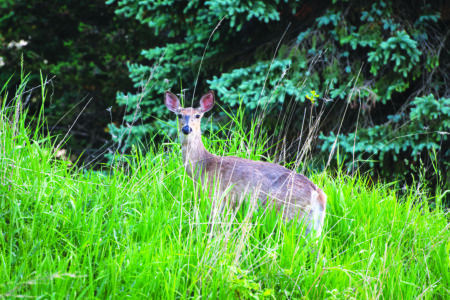Bad bunnies: don’t release house pets in the outdoors


It’s almost Easter, which brings to mind images of cute fluffy yellow chicks, pastel easter eggs, and little white rabbits. With bunnies being a calling card of the easter season, some families choose to add a pet rabbit to the family. Small animals like bunnies, turtles, snakes, hamsters, mice, and more can make great pets for your family for several reasons if you are prepared and commit to the responsibility. Bunnies are notorious nibblers, and many people find themselves quickly frustrated with this habit of what they thought would be just a cute cuddly pet.
This spring you may also probably notice the emergence of wild rabbits in your neighborhood. Wild rabbits enter their reproductive phases in early spring through mid-summer (February-September for cottontails, March-August for snowshoe hares). The cottontail rabbit and the snowshoe hare are both found in Michigan. They both are a prominent part of the natural ecosystem of Michigan and serve an important role as food for predator species, like hawks, owls, foxes, coyotes, wolves, bobcats, weasels, and mink.
Domestic rabbits, like those purchased at the pet store, are not the same animal as the wild rabbits or hares you see outside. Do not release pet rabbits in the wild! If you release your pet rabbit outside (which is illegal), there are only two outcomes. one outcome is it doesn’t survive and the other is that it does survive and establish as an introduced invasive species. Released rabbits have tremendous impacts through the voracious eating of vegetation and woody plants, burrowing that impacts soil and erosion, and taking away resources from wild native rabbits and hares. If you have a pet that you can’t care for anymore, contact your local animal shelter for help. They will help you surrender the animal for adoption, or help connect you with another family to take in your animal. Many breeds or species-specific rescue organizations can be found online.
Learn more about rabbits and hares in Michigan: www.michigan.gov/dnr/education/michigan-species/mammals/rabbit-hare
Michigan’s Reduce Invasive Pet and Plant Escapes program (RIPPLE, www.michigan.gov/invasives/take-action/landowners-gardeners-pond-owners/ripple), recommends contacting the store or breeder where the animal was purchased to find out about proper handling or possible returns of pet species that can’t be cared for anymore.
You may also be able to donate the animal as a classroom pet or to a local business. Your veterinarian can also provide advice on how to handle an animal you’re no longer able to care for.
The website, Don’t Let It Loose (www.dontletitloose.com), is another great resource for how to handle the responsible surrender of pets. Ultimately, know that getting a small animal pet doesn’t mean it’s going to be a small responsibility!






